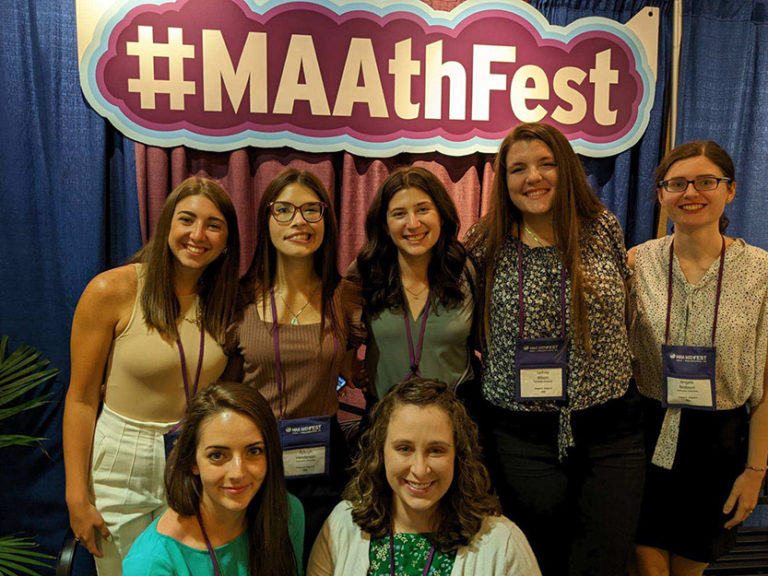- About MAA
- Membership
- MAA Publications
- Periodicals
- Blogs
- MAA Book Series
- MAA Press (an imprint of the AMS)
- MAA Notes
- MAA Reviews
- Mathematical Communication
- Information for Libraries
- Author Resources
- Advertise with MAA
- Meetings
- Competitions
- Programs
- Communities
- MAA Sections
- SIGMAA
- MAA Connect
- Students
- MAA Awards
- Awards Booklets
- Writing Awards
- Teaching Awards
- Service Awards
- Research Awards
- Lecture Awards
- Putnam Competition Individual and Team Winners
- D. E. Shaw Group AMC 8 Awards & Certificates
- Maryam Mirzakhani AMC 10 A Awards & Certificates
- Two Sigma AMC 10 B Awards & Certificates
- Jane Street AMC 12 A Awards & Certificates
- Akamai AMC 12 B Awards & Certificates
- High School Teachers
- News
You are here
Numbers, Infinity, and Reality: An Interdisciplinary Undergraduate Philosophy of Mathematics Course – Reflections
In both iterations of the course Numbers, Infinity, and Reality, it has been especially rewarding (and often amusing!) to acknowledge and share the various assumptions that different student constituencies may harbor regarding their peers. Philosophy and general education students, for instance, often labor under math-phobias, while math students may be wary of humanistic methods. We have found that explicitly addressing such stereotypes and preconceptions contributes to an air of openness and camaraderie amongst the students.
For our part, as instructors, it was extremely edifying to get the chance to learn from each other. We found that we were often in the position of students ourselves, learning right alongside the undergraduates. Such a re-figuring of the instructor's role, we believe, provides students with an important model of the diversity of disciplinary expertise, the value of intellectual humility, the capacity for lifelong learning, and the benefits of discourse across academic boundaries. We have enjoyed the course so much that we plan to offer it semi-regularly moving forward.
Several student remarks on the course evaluation indicated that the course was effective. We humbly provide one such example:
I loved this class so so much. I came into the class hoping I would learn a bit about math and a bit about philosophy, and I feel like I came out with my life changed. We discussed educational reform, social justice and stereotyping, tragedy and romanticism in mathematics, beauty and elegance, crocheting as a medium for complex mathematical models, and so much more. . . . There were some days, when I truly felt like I was participating in an academic community with curious and enthusiastic peers, that I almost felt like crying from joy. This is why I came to college!
We have observed additional evidence of the course’s impact on students, such as requests for directed independent study courses in related areas. A couple of the student participants continued on to PhD programs in mathematics or philosophy after graduation from Converse.

Figure 8. Sorrells with Converse mathematics students—including some participants in
Numbers, Infinity, and Reality—who presented a talk and a poster at MathFest 2022.
Nisbet Honors Program, Converse University.
There are many avenues for potential improvement of this course. While the course in its current form includes much open discussion among the students, all of the primary assignments were completed by individuals. A more collaborative approach, such as group projects or presentations, could bring further depth to the students' understanding and sense of camaraderie. Transferring additional ownership over the course material to the students creates an opportunity for them to present their work at conferences in either discipline. Finally, while texts and videos such as those by Alexander and Williams certainly spark discussions of diversity and inclusion, we plan to further bolster this aspect of the course by identifying and integrating new readings and in-class activities. Our objective is to involve more diverse perspectives, including intercultural and global histories of mathematics, political trends driving educational reforms, and the power dynamics that undergird inclusion and exclusion within the mathematical community.
Kevin DeLapp (Converse University) and Jessica Sorrells (Converse University) , "Numbers, Infinity, and Reality: An Interdisciplinary Undergraduate Philosophy of Mathematics Course – Reflections," Convergence (June 2023)




